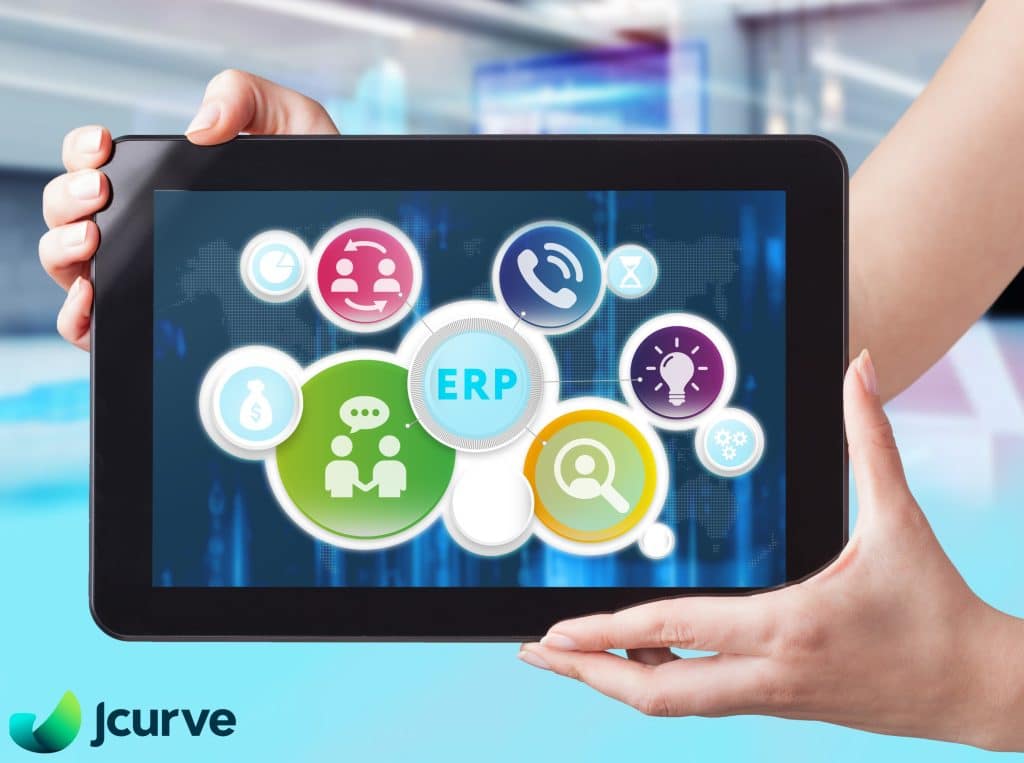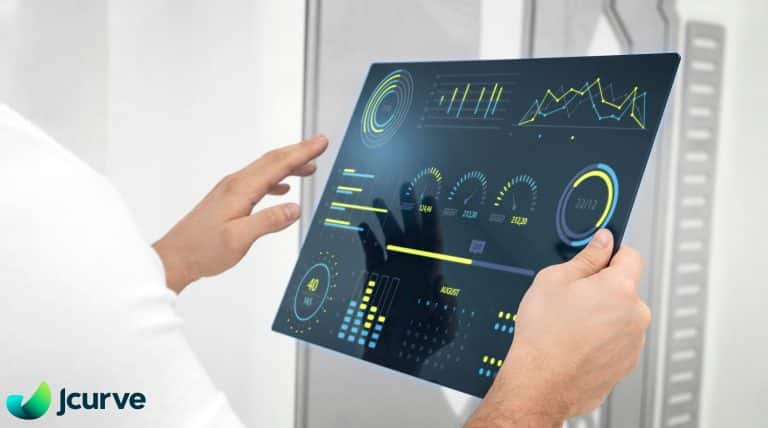As organizations grow, so does the need to efficiently manage the flow of information from various departments. However, as anyone who has started a business from scratch and scaled it into a larger company knows, this is easier said than done.
Managing information is a challenge for growing organizations, especially those that have teams working in silos. This is a common issue and one that an Enterprise Resource Planning or ERP solution can help you out with.
Table of Contents
What’s an ERP Solution?
What is cloud ERP solution?
How does the system work?
Example of a cloud ERP solution in action
What are the uses of an ERP solution?
Different types of ERP
Benefits of an ERP solution
Can ERP work for small businesses?
Do you need an ERP solution?
5 Sure Signs Your Company Needs an ERP Solution
So, what IS an ERP solution and why do you need one for your business?
What is an Enterprise Resource Planning (ERP) Solution?
Enterprise Resource Planning or ERP is a type of software application or program that integrates and unifies various departments within an organization and allows for automation of their day-to-day operations. It can also help with technical forecasting – but more on this later.
Businesses of all sizes generate a lot of data every day. This means that making sense out of this data and getting helpful insights from it to make smart business decisions can be a challenge, especially when there are silos created within your company, resulting from the reality that different departments use different applications to update and extract data.
ERP software compiles all that data and stores it in a centralised database that managers can access and review to make the right decisions. This data can also be accessed by staff from various departments: warehouse and inventory, human resources, finance – who can then easily update information, so management always has accurate data available.
Simply put, ERP solutions provide a scalable and smart way to coordinate and connect the various aspects of your growing business. You don’t have to rely on manual spreadsheets and wait for paper reports to extract information. The software does all of that for you.
The idea behind ERP started in the 1940’s to 1950’s with MRP (Material Requirements Planning). Companies used MRP to input details about materials for products into a computer mainframe and used that database to create purchase orders.
As expected, more and more companies used the technology. MRP became MRP II or better known as Manufacturing Resource Planning, which became the precursor to the ERP solutions we all know today.
With the onset of 1990’s ERP usage evolved massively throughout the next couple of decades. The latest iteration of course being the Cloud ERP Solution. Which brings us to the next question…
What is a cloud ERP solution?
A cloud-based ERP provides a seamless ERP solution to organisations that don’t want to go through the hassles of setting up an on-premise ERP and having to manage the system 24/7. With cloud ERP all you need is a reliable internet connection, and you can access the entire system remotely from anywhere, at any time of the day (or night) because all data is stored on the cloud. Data is encrypted, of course for safety.
Best of all, a cloud ERP solution costs a fraction of setting up and maintaining on-site ERPs and this has made it popular among business owners.
So how does the system work?
In theory, the workings of ERP solutions are simple. It’s a system that unifies your business processes by storing all the data from different departments in one platform. You can adjust the access level of users depending on seniority or job function since the system comes with a dashboard that allows you to personalise depending on your use case.
All departments input data into the system using formats you’ve pre-set. Data is then stored into a centralised database where the system then performs analytical functions. So, let’s say a sales manager wants to review the quality of the leads from the marketing team, he can access the pertinent data with a few clicks. Should HR want to report on attendance and attrition rates – the system helps them generate specific reports they need.
Because the data is taken from each module and stored in a central location, this eliminates errors and duplicate information. In addition, ERP solutions allow for third-party integrated apps to further help smoothen your business processes.
Being able to access all information and progress rates from these modules and unified dashboards, you and the rest of management can make smart business decisions and do it faster.
Example of a cloud ERP solution in action
Imagine a scenario in which a customer creates an inquiry to place a bulk order. All details from this inquiry are instantly sent and synched with warehousing, inventory, production, and shipping to make sure that your company can fulfil the order.
This is also synchronised and checks tax estimates, so the order price is calculated. An invoice is generated based on these calculations, which the sales team can forward to the customer.
If the customer chooses to go ahead with the bulk order, a detailed list of materials, activities and manpower involved are immediately sent to the respective teams through their respective system dashboards or modules.
The whole process is accessible and monitored, and allows for the necessary adjustments to keep production, fulfilment, and delivery on track. Progress reports can also be made available if your business requires it.
What are the core uses of an ERP solution?
ERP solutions are used when a company’s growth starts to overwhelm, its staff’s capability to coordinate day-to-day processes. The uses of ERP and all its modules can be summarised as:
- Evaluating the loss of efficiency at each business process and building a framework that minimise this loss.
- Collecting data from different departments through standard data entry, integrated devices, and any peripheral software.
- Automating workflows to delegate responsibilities in a coordinated manner.
- Generating progress reports and providing insights for contingency planning strategy should the need arise.
- Monitoring various business processes real-time.
Without an ERP solution, it can be very difficult to coordinate the various functions of departments. When this happens, overall efficiency drops below what’s considered sustainable for a growing business. This is because reporting lots of data and verifying it manually consumes a lot of time and leaves a lot of room for error.
The problem gets worse when a company operates from various locations which leads to the company executives having limited to no visibility on how day-to-day operations are performed. The company ultimately starts to lose money and is crippled by executives making less than strategic decisions based on inaccurate data.
Cloud ERP solutions coordinates and unifies all business processes, expedites flow of data, and automates workflow within a company using gated access. Users are provided with real-time, accurate overview of business operations. This ensures that everyone in the organisation work in coordination with one another to achieve the overall business goals.
Different types of ERP solutions
Classifying ERP solutions is done in the basis of their architecture. The different types are as follows:
On-site ERP solution
Onsite ERPs are also known as legacy ERP – are installed in the company’s server that’s physically present in their location. This requires companies to install required hardware and look after the operating conditions. This needs to have in-house IT professionals for maintenance and troubleshooting.
Hybrid ERP solution
Data is stored in an actual server, with the rest of the data sets synced with cloud-based servers. Architecture is divided between the physical and cloud-based servers, with users able to manage the system centrally.
Cloud ERP solution
Cloud ERPs are a Software as a Service (SaaS) type of solution. All data and processing are installed in a single location for every company using a multi-tenant model. Because data is stored outside a company’s premises, this solution requires state-of-the-art security protocols since business information and intellectual property is all accessible online.
Cloud ERP for all business size is more economical since you can use the system at several locations with just one license. Updates are done on the server and instantly reflected on the users’ systems. Troubleshooting and maintenance is simple, cost-effective and less time consuming for both user and vendor.
ERP solutions come with modules built into the system, plus modules you can add on. Many systems offer a range of tailored modules that’d fit your company’s specific needs. These ERP modules include:
Accounting, finance and purchasing
This ERP module involves shipping, purchasing and all finance compliance functionality. It works by eliminating errors caused by inaccurate data entry and is very helpful for companies with multiple locations.
Human Resources
This module works by generating data needed by employee benefits and payroll, providing the company with helpful insights about employee performance, attendance, travel history, which can be helpful for different purposes like promotions or department transfers.
Inventory Management
Allows you to update and monitor pipeline and stock inventory as well as lead times, vendor information, consumption rate, storage period to maintain consumption fitness, and more.
Production Management
Helps you manage production and other functions that include periodic maintenance, coordinating production processes, making sure that consumables are available and order details are followed while implementing strict quality control.
Warehouse Management
Allows users to identify all items stored, as well as how much space is available. It helps coordinate inventory movement and warehouse managers and supervisors can access auto-generated reports for order picking, packing, and shipping forms.
Sales and Marketing
This module coordinates the activities of your marketing and sales teams. It provides feedback to quality control and production departments about product quality and demand.
Benefits of an ERP solution
Total visibility
Complete visibility is one of the top benefits of ERP for all business sizes. Using the system correctly gives you complete accessibility and visibility to your company’s processes. Each member can access data from within their departments in just a few clicks.
Real-time information and accurate data
To be able to access real-time information about your company instantly, is critical. Every company requires a system that allows for a streamlined flow of data so departments within your organisation can access information they need so they can do their jobs efficiently.
Using an ERP system, you get accurate, real-time information that helps you make smarter business decisions. This way you can stay ahead in a competitive market.
Boosts efficiency
With an ERP system in place, you eliminate repetitive processes and duplicate tasks. It also reduces the need to manually complete tasks. The system basically streamlines your core business processes and make data collection more manageable and more efficient for every member in each department.
Effective forecasting
ERP solutions provide managers and users with the tools they need to do effective forecasting. With real-time, accurate information on hand, managers can make realistic estimations and do effective forecasting.
Cost-efficient
Being able to access real-time, correct information from one unified source, means you get to cut down on operational and administrative costs. You get to make smart business decisions that help your company save money and allocate financial resources on other areas of the business that need it more.
Improved customer service
ERP solutions come with CRM applications. Customer relationship management is an important part of staying competitive in your niche. Retaining customers is a crucial thing in the survival and success of any business.
An integrated CRM application in an ERP system leads to improved communication and enhanced relationship with your customers.
businesses?
While ERP began as a tool used mostly by large organizations, it has evolved into an easily scalable and flexible solution for businesses of all sizes. These days, small and medium sized businesses implement ERP which allows them to grow into a more profitable, more efficient organization.
ERP implementation – best practices
Regardless of the size of your business, successful ERP implementation is crucial. Therefore, knowing the best practices in implementing an ERP solution within your operations is necessary.
Establish a strong project team
This is the first step when implementing an ERP solution. Usually, a project team includes having a dedicated project manager, and a representative from different business groups in the project. The project manager would be in charge of adjusting prioritizing and arranging resources as per the needs of the implementation.
Choose the right methodology
Choosing the best way to implement your ERP system is necessary in the overall success of implementation.
Spend time training
Making sure that your staff gets proper training on how to use the system helps with overall efficiency, faster implementation which allows for faster ROI from the software.
Data migration
Migrating data to an ERP platform is tough during implementation as there’s a risk of losing data when consolidating information from the different applications.
Validating data after the migration process is important as it ensures that important information was successfully transferred into the new system. This also gives an opportunity for the implementation team to do some initial troubleshooting where necessary.
Do you need an ERP solution?
If you want to scale your business, build a solid knowledge base, and improve your core business processes, then yes – you need an ERP solution.
Implementing ERP systems doesn’t mean you would have an army of IT professionals descending on your office and taking over your operations. Cloud ERP solutions do not require changes to your existing hardware. If you have a reliable internet connection, you log-in and you can have access to your ERP system wherever you are.
Without the need for on-site installation, and the flexibility to choose modules and features that your business needs, an ERP solution is also not as costly as you may initially think. Even if you can’t see any room to improve your operations and think that you don’t need an ERP right now, there is a good chance that your business competitors are already using one. So, if you want to stay competitive, you must make sure you are using the right tools.
Five sure signs your company needs and ERP solution
No one is saying that an ERP solution will solve ALL your business challenges. But it will certainly help stabilise your day-to-day operations and allow you to focus on growing your business even more.
Here are five key indicators that you need to implement an ERP system for your company:
- You are experiencing a lot of cash flow errors. It’s hard to understand the flow of money because you are using different spreadsheets to “keep track” of cash flow.
- You use different types of software for every core business process. Using different software can create silos and problems within your business processes.
- You are doing sales tracking manually and relying too much on paper reports for sales updates.
- You are spending a lot of money and time on IT upgrades and maintenance.
- You don’t have accurate information on how profitable your business is.
Get Started with Enterprise Resource Planning (ERP)
An ERP solution works with you as you grow your business. Whether you’re developing workflows, updating processes, bringing in new business opportunities, all of it can easily be added to your ERP.
Investing in ERP solutions is an investment towards the future of your business. Jcurve can help evaluate your current business processes and ensure you integrate the best ERP system to grow your organisation, assist in agile decision-making, streamline your operations, and so much more.









